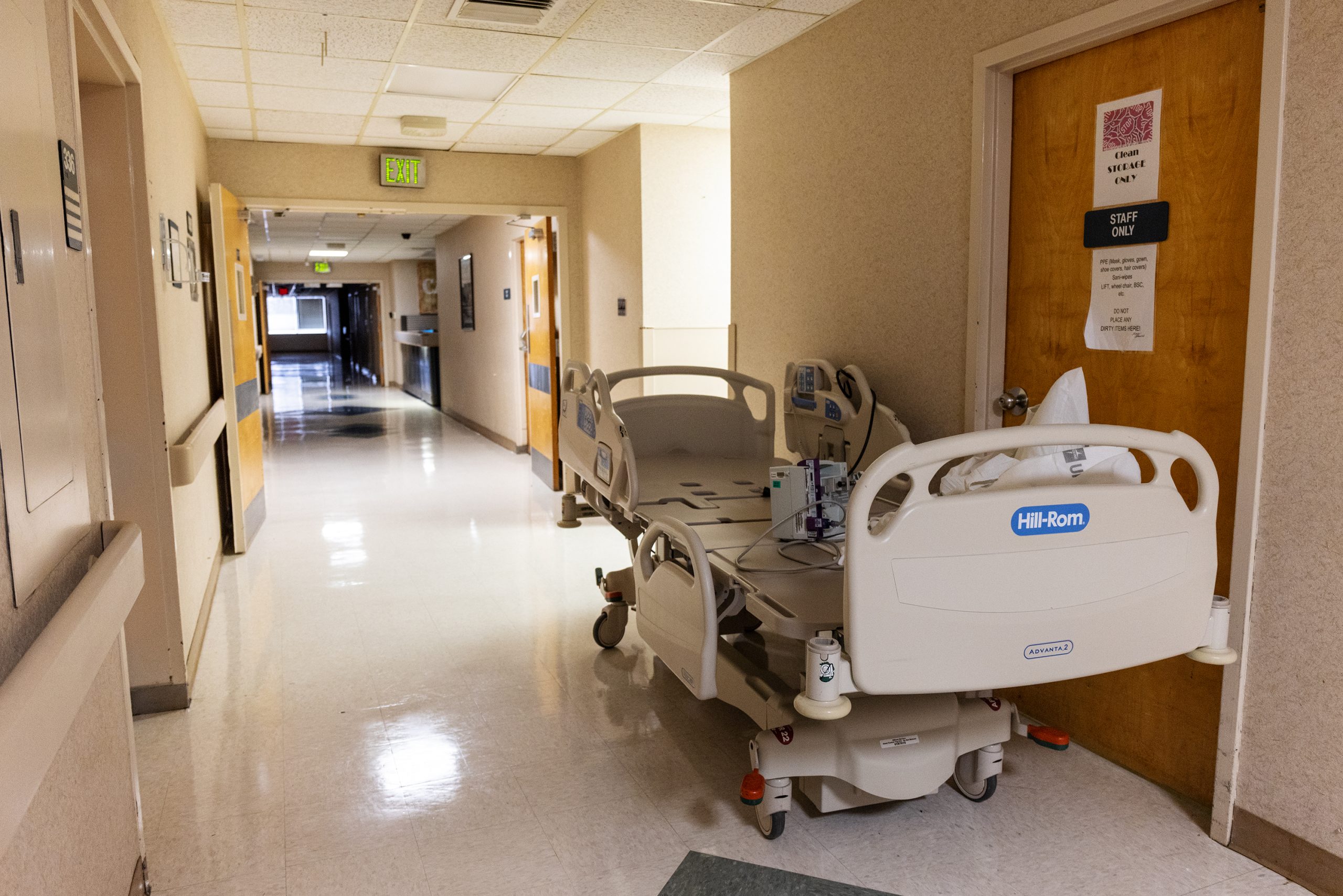Mississippi Today
In last ditch effort to stay open, Holly Springs hospital ends inpatient care

In last ditch effort to stay open, Holly Springs hospital ends inpatient care
Alliance Healthcare System in Holly Springs is Mississippi's first rural emergency hospital – the first in a trend some say indicates the further decline of health care access in the one of the country's poorest and sickest states.
Hospitals were able to apply for the new federal designation mere weeks ago, when the Mississippi Department of Health rolled out its rules for “rural emergency hospitals.” The federal government finalized the program in November.
Rural emergency hospitals are a step below critical access hospitals, which must have 25 or fewer inpatient beds, provide emergency services, keep its patients for less than 96 hours and be located at least 35 miles from another hospital.
The resources at rural emergency hospitals are even fewer — they must end all inpatient care and transfer patients to larger hospitals within 24 hours of the patient coming to the emergency room.
The hospital has already begun getting rid of all its inpatient beds and discharging current patients, as reported by the South Reporter, Marshall County's community newspaper, on Wednesday. The acute care center is currently licensed for 40 beds, though its daily census doesn't go much higher than four or five patients a day, according to hospital CEO Dr. Kenneth Williams.
The hospital has partnered with North Mississippi Medical Center and will transfer its patients there if necessary, he said.
He also said Alliance is one of just a handful of hospitals across the country approved for the designation so far.
As of Thursday, spokespeople from the state Department of Health said Alliance's new hospital designation hadn't been approved by the Centers for Medicare and Medicaid Services. But according to Williams, it had been approved by both required parties, CMS and the state Health Department, on Wednesday.
“I haven't even had a chance to share this with my staff,” he said Thursday. “Yesterday was an exciting day for me to have that designation. I'm looking forward to the future to see how it works out.”
Rural emergency hospitals also can't provide swing bed services, which means if a hospital operates a nursing home, that has to close. Alliance does not operate a nursing home.
Both rural emergency and critical access hospital designations are meant to ease financial stress — if a hospital qualifies as either, in exchange, they get paid more for their services. Rural emergency hospitals also get monthly payments from the federal government.
The program is aimed at preventing the closure of rural hospitals and creating a way they can increase financial viability and maintain operations. The idea is that rural hospitals at risk of closure already struggle with low patient counts and low payments for inpatient care.
But it's meant as a last resort for hospitals that are barely surviving because of the limited amount of services a rural emergency hospital can offer.
State Health Officer Dr. Dan Edney considers it a closure when a hospital converts to an REH because of the loss of services. He tweeted in early February about the state's first “loss” of a hospital, which is around the time Alliance applied for the designation with the Centers for Medicare and Medicaid Services and the Mississippi Department of Health. He compared rural emergency hospitals to triage units.
Williams, on the other hand, sees them as “expanded outpatient hospital systems.”
Rep. John Faulkner, a Democrat who represents Holly Springs, was not immediately available for comment Friday morning.
Williams bought the hospital two decades ago when he heard it was struggling. During its first years under Williams, he said the hospital was making money. Then in 2006, it lost almost $2 million with the arrival of Medicare Advantage plans, which are privatized versions of Medicare that often deny needed care and underpay hospitals.
Holly Springs is a certified retirement community, which means most of the hospital's patients are on Medicare.
They've had good years and bad years since, but it's been mostly downhill, especially since the pandemic began.
“I knew that our hospital couldn't exist under the payment system it is under right now,” Williams said.
A little more than a decade ago, Alliance tried applying to become a critical access hospital. They were rejected because of the hospital's proximity to Memphis.
Now, Williams says the federal rules are a little more relaxed, and he decided to apply at the recommendation of his partner, Quentin Whitwell, who operates hospitals in north Mississippi and serves as legal counsel for Alliance Healthcare, and the hospital's financial team.
“With REH, the robust outpatient services the clinic brings to the community will be enhanced, along with continued 24/7 coverage, and the costly services will be reduced while receiving an annual subsidy,” Whitwell said when reached by text Thursday. “We are glad it worked out.”
Few Mississippi hospitals are making money, especially in the state's more rural regions. The problem is multifaceted, but experts say the crisis has resulted from a combination of state leaders' refusal to expand Medicaid, insurance companies' low reimbursement rates and the pandemic forcing costs up in all areas, including staffing.
“The funding of health care in rural America is going down,” Edney previously told Mississippi Today in an interview. “There is no one coming to the rescue.”
Williams said many of the challenges hospitals are facing lead back to insurance payments and managed care plans, like Medicare Advantage.
He could've closed the hospital back in 2012, Williams said, when it first applied for critical access status, but he's done everything he can to keep it open, including some layoffs and reorganizing their staff.
But at some point, “you cut muscle instead of fat,” Williams said.
One report from the Center for Healthcare Quality and Payment Reform puts a third of rural Mississippi hospitals at risk of closure, and half of those within a few years.
“Too many small rural hospitals are closing,” Williams said. “Big hospitals are struggling, whether or not they admit it, but you can get by if you're doing high-end procedures.
“But just to take care of a regular patient who has congestive heart failure, with diabetic ketoacidosis, who is sick, they (insurance companies) don't want to pay you for it.”
According to data from the CHQPR, Alliance Health has been losing money for the past few years, both overall and specifically taking care of patients.
And just in case the rural emergency hospital structure doesn't work, Alliance is still applying for the critical access designation, too. If the new designation doesn't stabilize the hospital, it can revert to its original status as an acute care facility or, if it is approved for the critical access hospital designation, it can convert to that, instead.
“Would I prefer to have us continue to operate the way that we were, having patients be admitted? Absolutely,” Williams said. “It is unfortunate that we had to make this move, but it is the right move based on the reality of health care and this payment system.”
According to Edney, Mississippi can likely expect more conversions to rural emergency hospitals – or, as he refers to them, “closures” – in the coming months.
This article first appeared on Mississippi Today and is republished here under a Creative Commons license.
Mississippi Today
Podcast: How the 2024 Medicaid expansion debate died

Mississippi Today's Adam Ganucheau, Bobby Harrison, Geoff Pender, and Taylor Vance discuss the breakdown of Medicaid expansion negotiations in the Legislature.
This article first appeared on Mississippi Today and is republished here under a Creative Commons license.
Did you miss our previous article…
https://www.biloxinewsevents.com/?p=355689
Mississippi Today
On this day in 1917
May 5, 1917

Eugene Jacques Bullard became the first Black American combat pilot.
After the near lynching of his father and hearing that Great Britain lacked such racism, the 12-year-old Georgia native stowed away on a ship headed for Scotland. From there, he moved to Liverpool, England, where he handled odd jobs before becoming a boxer, traveling across Europe before he settled in Paris.
“It seems to me that the French democracy influenced the minds of both White and Black Americans there and helped us all to act like brothers as near as possible,” he said. “It convinced me, too, that God really did create all men equal, and it was easy to live that way.”
When World War I began, he was too young to fight for his adopted country, so he and other American expatriates joined the French Foreign Legion. Through a series of battles, he was wounded, and doctors believed he would never walk again.
No longer able to serve in the infantry, an American friend bet him $2,000 that he could not get into aviation. Taking on the challenge, he earned his “wings” and began fighting for the French Aéronautique Militaire.
He addressed racism with words on his plane, “All Blood Runs Red,” and he nicknamed himself, “The Black Swallow of Death.”
On his flights, he reportedly took along a Rhesus monkey named “Jimmy.” He tried to join the U.S. Air Service, only to be turned away because he was Black. He became one of France's most decorated war heroes, earning the French Legion of Honor.
After the war he bought a Paris nightclub, where Josephine Baker and Louis Armstrong performed and eventually helped French officials ferret out Nazi sympathizers. After World War II ended, he moved to Harlem, but his widespread fame never followed him back to the U.S.
In 1960, when French President Charles de Gaulle visited, he told government officials that he wanted to see his old friend, Bullard. No one in the government knew where Bullard was, and the FBI finally found him in an unexpected place — working as an elevator operator at the Rockefeller Center in New York City.
After de Gaulle's visit, he appeared on “The Today Show,” which was shot in the same building where he worked.
Upon his death from cancer in 1961, he was buried with honors in the French War Veterans' section of the Flushing Cemetery in Queens, New York.
A sculpture of Bullard can be viewed in the Smithsonian National Space and Air Museum in Washington, D.C., a statue of him can be found outside the Museum of Aviation, and an exhibit on him can be seen inside the National Museum of the U.S. Air Force, which posthumously gave him the rank of a second lieutenant. He is loosely portrayed in the 2006 film, “Flyboys.”
This article first appeared on Mississippi Today and is republished here under a Creative Commons license.
Mississippi Today
A seat at table for Democrats might have gotten Medicaid expansion across the finish line
The Mississippi Capitol is 171,000 square feet, granted a massive structure, but when it comes to communication between the two legislative chambers that occupy the building, it might as well be as big as the cosmos.
Such was the case in recent days during the intense and often combustible process that eventually led to the death of Medicaid expansion and with that the loss of the opportunity to provide health care for 200,000 working poor Mississippians with the federal government paying the bulk of the cost.
Democrats in the state House came under intense pressure and criticism for blocking a Medicaid expansion compromise reached by Republican House and Senate negotiators.
First of all, it would be disingenuous to argue that Democrats, who compose less than one-third of the membership of either chamber, blocked any proposal. Truth be known, Republicans should be able to pass anything they want without a solitary Democratic vote.
But on this particular issue, the Republican legislative leadership who finally decided that Medicaid expansion would be good for the state needed the votes of the minority party, which incidentally had been working for 10 years to pass Medicaid expansion. The reason their votes were needed is that many Republicans, despite the wishes of their leaders, still oppose Medicaid expansion.
The breakdown in the process could be attributed to the decision of the two presiding officers, House Speaker Jason White and Lt. Gov. Delbert Hosemann in the Senate, not to appoint a single Democrat to the all-important conference committee.
Conference committees are formed of three senators and three House members who work out the differences between the two chambers on a bill. Considering that Democratic votes were needed in both chambers to pass Medicaid expansion, and considering Democrats had been working on the issue for a decade while Republicans blocked it, it would have made sense that they had a seat at the table in the final negotiations process.
One Democrat from each chamber on the conference committee could not have altered the outcome of the negotiations. But the two Democrats could have provided input on what their fellow legislative Democrats would accept and vote for.
In the eyes of the Democrats, the compromise reached without their voice being heard was unworkable and would not have resulted in Medicaid expansion.
The Republican compromise said Medicaid would not be expanded until the federal government provided a waiver mandating those on Medicaid expansion were working. Similar work requirement requests by other states have been denied. Under the compromise, if the work requirement was rejected by federal officials, Medicaid expansion would not occur in Mississippi.
After voicing strong objections to the work requirement, House Minority Leader Rep. Robert Johnson, recognizing the Senate would not budge from the work requirement, offered a compromise. The Johnson compromise to the compromise was to remove a provision mandating the state apply annually with federal officials for the work requirement.
Instead, under Johnson's proposal, state Medicaid officials would be mandated to apply just once for the work requirement. If it was rejected, Medicaid expansion would not occur, but hopefully that would compel the Legislature to take up the issue of the work requirement and perhaps remove it.
“We just want the Legislature to come back and have a conversation next year if the federal government doesn't approve the work requirement. It's as simple as that,” Johnson said.
Senate leaders agreed that Johnson's proposal was a simple ask and something they might consider.
But Lt. Gov. Delbert Hosemann, who presides over the Senate, said he never heard Johnson's proposal until late in the process — too late in the process, as it turned out.
Speaker Jason White, R-West, also said he never heard the proposal, though Johnson said he repeatedly discussed it with House leaders. He certainly was relaying the information to the media during the final hectic days before Medicaid expansion died.
And perhaps if Johnson or one of his Democratic colleagues had been on the conference committee, that information would have been heard by the right legislative people and perhaps Medicaid expansion would not have died.
After all, a conference room or an office where negotiators are meeting to hammer out a compromise is much smaller than the massive state Capitol, where communications often get lost in the cosmos.
This article first appeared on Mississippi Today and is republished here under a Creative Commons license.
-
SuperTalk FM4 days ago
Driver’s education set to become mandatory in Mississippi as bill passes
-
SuperTalk FM7 days ago
Festival merger in Leland sets up one major event for Mississippi Delta
-
SuperTalk FM3 days ago
State approves $160M to expand Highway 7 to four lanes in Lafayette County
-
Mississippi Business5 days ago
Geartek expanding operations in Alcorn County
-
SuperTalk FM7 days ago
PERS bill set to phase in employer rate increase heads to governor’s desk
-
Mississippi News6 days ago
Two women accused of shoplifting across southeast captured in Mississippi
-
Mississippi News4 days ago
Altercation at Mississippi police department leads to officer-involved shooting
-
Mississippi News6 days ago
Starkville police make arrest in shooting at Dawg Wash South








































